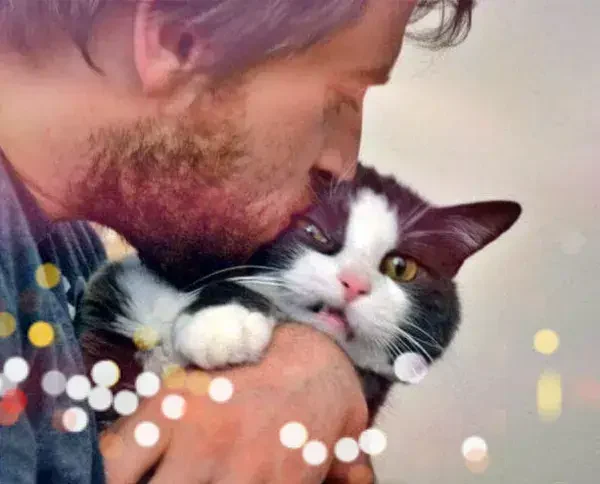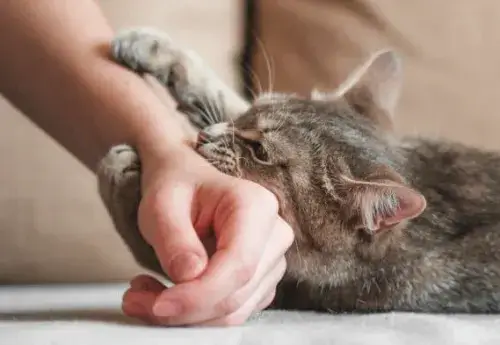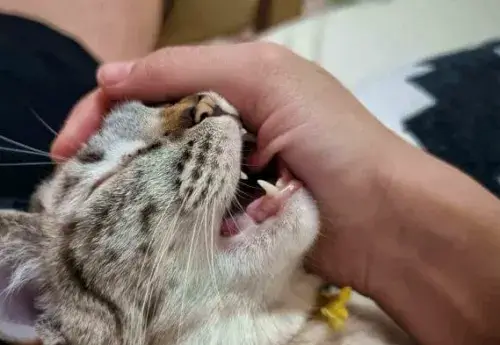Cat bites. Why does your cat gently nip at you while you’re petting them, or approach you and softly mouth your hand? This behavior can be confusing.
Your feline friend doesn’t seem aggressive, yet they’re acting strangely. Before you scold your pet, understand that these nips have perfectly logical explanations.
Unlike dogs, cats express emotions more subtly, and a nip isn’t always a sign of anger. It’s crucial to consider the context and your cat’s body language.
Often, a gentle, light bite is a sign of affection and love! Let’s explore why your cat might be nipping you and what, if anything, you should do about it.
Cat bites, Nuances of Feline Affection.
Understanding Your Cat’s Nips.
When your cat bites during petting, it’s not always a cause for concern. This common behavior has several underlying reasons, and understanding them is key to a harmonious relationship with your furry companion.
“Petting-Induced Overstimulation”
One common reason for a gentle nip is what veterinary behaviorists call “petting-induced overstimulation.”
While your cat enjoys your affection, there’s a point where they become overwhelmed. Their brain can get saturated with tactile sensations. In this scenario, a nip is your cat’s polite way of saying, “That’s enough, please.”
It’s not a sign of aggression but rather a signal that they need a break from the petting.
Playful Interaction.
Especially with younger cats and kittens, a soft nip can simply be an invitation to play. If your cat is relaxed, their ears aren’t flattened, and the bite is gentle, they might just be trying to engage you in a game, just as they would with another cat.
This behavior helps them practice their natural hunting skills.
Seeking Attention.
Some cats learn that a gentle nip elicits a reaction from their human – a glance, a word, or a movement. This can develop into a habit where they nip to get your attention. They’ve discovered it’s an effective way to communicate their desire for interaction.
A Display of Affection.
“Love Bites”.
Perhaps the most heartwarming reason for a cat’s nip is what’s known as a “love bite.” These are light, non-aggressive nips often accompanied by purring, licking, or a warm gaze.
This behavior is commonly observed in cats grooming or interacting with their kittens, and when directed at you, it signifies deep trust and affection.
Deciphering “Love Bites”.
How to Recognize Them.
A “love bite” is distinct from an aggressive attack; it’s a special form of communication that expresses your cat’s feelings.
It’s usually accompanied by other signs of affection: purring, sniffing, licking, or a soft, warm look in their eyes. Here’s how to differentiate a love bite from a truly aggressive one:
• Weak, Superficial Bite: The bite is gentle, without breaking the skin. It’s more of a soft mouth-hold, akin to slow-motion play.
• Relaxed Body Language: Your cat’s body will appear relaxed: ears aren’t flattened, eyes may be half-closed, and their tail won’t be twitching erratically.
• Preceded by Licking (Often): Often, but not always, the nip is preceded by licking. This is part of a grooming ritual, similar to how they would groom other cats.
• No Retreat After the Bite: After the nip, your cat won’t run away. On the contrary, they might stay close, rub against you, or continue purring.
Why Do They Do It?
Many feline behaviors originate from their kittenhood. The acts of licking and gentle nipping are rooted in an instinct to care for members of their group.
When your cat “love bites” you, it’s a sign of trust and belonging, indicating that they view you as a cherished part of their family.
What Should You Do?
If the bite isn’t painful and doesn’t bother you, there’s no need to do anything. It’s simply your cat’s unique language of love. However, if you find it uncomfortable, calmly withdraw your hand and redirect their attention to a toy.
The key is not to react harshly, as this could damage their trust.
When a Cat’s Bite Signifies Aggression or Illness.
In contrast to a gentle nip, if your cat’s bite is sharp, forceful, accompanied by flattened ears, dilated pupils, and hissing, this indicates aggression or fear.
The reasons for such behavior can include:
• Pain or Discomfort: Your cat might be in pain or feeling unwell, making them irritable when touched.
• Stress and Irritation: An increase in stress or irritation can lead to defensive biting.
• Territorial Defense: Your cat might be attempting to protect their territory.
• Sudden Movement: A sudden or startling movement on your part could trigger a defensive bite.
In such cases, it’s crucial not to punish your cat. Instead, try to identify the trigger for their behavior. It might be wise to consult a veterinarian to rule out any underlying medical conditions.
Cat bites are a form of communication.
By understanding their reasons, you can avoid misunderstandings and strengthen your bond with your pet. Sometimes, simply altering your interaction style can transform a defensive bite into a soft sign of affection.
What NOT to Do with Your Cat.
A Guide to Building a Healthy Relationship.
Building a strong bond with your feline companion requires understanding their needs and respecting their boundaries. Here are some critical “don’ts” to ensure a happy and healthy relationship:
Never Tease Your Cat – It’s a Direct Path to Stress.
Many people believe that playing with a cat involves teasing them with their hands, blowing in their face, or cuddling them when they’re not in the mood.
However, this can seriously damage your relationship. Cats generally dislike having air blown in their faces (though there are exceptions) due to their highly sensitive noses; a sudden gust of air causes discomfort.
Furthermore, persistent hugging and rough handling, especially when your cat wants to be left alone, can lead to stress, aggression, and even fear of humans.
Always approach your cat with respect for their personal space and preferences.
Never Expose Your Cat to Danger.
If you think letting your cat roam freely outdoors is giving them freedom, consider the dangers that await them. Cars, other animals, parasites, and infections are just a few of the risks.
An outdoor life for a cat is not an adventure; it’s a constant risk.
Even indoors, dangers can lurk: toxic plants, medications, household cleaners, and even common threads or holiday tinsel. These can cause choking or intestinal blockages.
Ensure your home is safe for your feline family member and choose safe, interactive cat toys, especially those that mimic prey.
Your Cat Cannot Be Bored.
Boredom Can Destroy Their Psyche.
Like humans, cats can suffer from boredom. When a cat has nothing to do, behavioral problems can emerge: shredded curtains, torn sofas, and even aggression.
Don’t leave your cat to combat boredom alone. Install shelves, scratching posts, and provide both physical and mental stimulation. Invest in interactive toys that simulate prey (like laser pointers or squeaky toys) and puzzle feeders.
These items will keep your furry friend entertained and help prevent behavioral issues.
Never Punish Your Cat.
It’s Useless and Harmful.
Cats do not understand punishment. Yelling, hitting, or nose-tapping will not work. Instead, you’ll only destroy their trust, and they’ll start to fear you. The best way to modify behavior is through positive reinforcement.
Praise, treats, and petting all help your cat understand they’re doing something correctly. Use veterinarian-recommended cat treats, and you’ll find success. When it comes to undesirable behavior, ignore it. For example, if your cat bites, immediately stop the interaction.
Never Declaw Your Cat – It’s Cruel and Dangerous
Many mistakenly believe that declawing is just a feline manicure. In reality, it’s the amputation of the last bone of each toe.
Declawing causes not only pain but also significant behavioral problems. Instead, offer your cat a variety of scratching posts, regularly trim their claws with specialized clippers, and use furniture covers if needed to protect your belongings.
Don’t Forget About Parasite Control.
Fleas and ticks in cats aren’t just an itch; they also pose a risk of infections, anemia, and skin diseases. Even if your cat is strictly indoors, don’t forget about intestinal worms, which can also cause considerable harm.
Therefore, your cat needs to be regularly dewormed (every 3-6 months). Use veterinarian-recommended parasite control products – whether drops, pills, or special collars. Also, remember to inspect and comb your pet if they spend time outdoors, for instance, at a cottage.
Don’t Leave Your Cat Alone for Too Long.
Despite their independent nature, cats need social interaction. In their own way, they miss their human companions. Prolonged loneliness can lead to stress and depression in cats.
If you have a busy schedule, consider finding a companion for your cat or asking someone to look after them. Automatic feeders, water dispensers, and smart pet devices can help, but they cannot fully replace your attention and companionship.
Smoking Near Your Cat.
A Crime Against Their Health
Secondhand smoke harms cats even more than it harms humans! Their bodies accumulate toxins more quickly: smoke settles on their fur, and when they groom themselves, they ingest a double dose of toxins.
This can lead to asthma, allergies, and even cancer. If you smoke, do so in a way that doesn’t expose your cat – they deserve to breathe clean air. Always wash your hands after smoking and before petting your cat.
Understanding your cat’s needs is the foundation of responsible pet ownership. Respect your cat’s individuality, and they will repay you with love, comfort, and soft purrs.
Have a Great Day!







The cat sniffs something on the floor, suddenly freezes, lifts its upper lip and hangs there with its mouth slightly open… Its face at this moment is like that of a person who has heard something strange and is digesting it.
Do you recognize it?
This often happens near shoes, on pillows, near bags and even in places where there seems to be nothing.